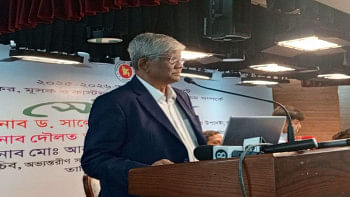Climate finance: Civil society groups demand $1.5 trillion

Civil society groups have demanded $1.5 trillion climate finance for victim nations of climate change for the 2025-30 period.
They also opposed any text and criteria that shift the responsibility from developed to LDC [Least Developed Countries] and developing countries during a dialogue, titled " From millions to trillions: the transformations needed to finance climate justice" that took place at the CoP 29 climate conference center in Baku.
Representatives from various Civil Society Organizations (CSOs) including Lidy Nacpil of Asia Pacific Movement on Debt & Development, Philippines; Ezequiel Steuermann from Network for Economic, Social and Cultural Rights-ESCR, Argentina; Patricia Wattiena from ESCR-Net, USA; and Aminul Hoque from COAST Foundation, Bangladesh; and many other civil society representatives from different countries participated in the talks and shared their insights.
Katja Voigt from Rosa Luxemburg Stiftung, Germany has moderated the dialogue.
Speakers said climate finance is sought for the survival of the most vulnerable countries and overall for humanity, not for any development.
Resources under the ongoing NCQG New Collective & Quantified Goal must be new and additional, predictable, adequate, affordable, grant-based, and concessional, enhancing fiscal space without creating fiscal constraints.
Aminul Hoque said the most vulnerable countries like Bangladesh cannot mobilise additional money for survival spending where the country needs around $3.5 billion per year. Developed countries have to pay the sum under Paris Agreement [PA] Article 9.1 as they are responsible for creating climate crisis, he opined.
Lidy Nacpil said an ambitious NCQG provision and mobilisation of 1.5 trillion is a lifeline for vulnerable communities. It is estimated that the financial support needed for implementing our NDCs will stand at $1.48 trillion by 2030.
This translates into a requirement of $220 billion per year for the LDCs alone. The NCQG must reflect on its operational features that give full effect to Articles 9.4 [Scale up finance] of the PA, aligning with the needs and priorities of developing countries and must also incorporate tailored features for SIDS and LDCs, she demanded.
Ezequiel Steuermann said non-concessional loans and export credits cannot be counted as climate finance.
"There cannot be any conditions for finance access, and all elements of the goal must respect the countries' sovereignty', she said.
Patricia Wattiena called developing country parties to be united to raise their voice on this issue in the coming days of negotiation.

 For all latest news, follow The Daily Star's Google News channel.
For all latest news, follow The Daily Star's Google News channel. 



Comments